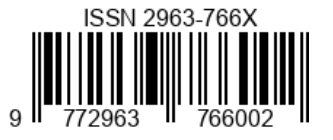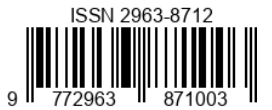Transformasi Proyek Melalui Keajaiban Kecerdasan Buatan: Mengeksplorasi Potensi AI Dalam Project Management
DOI:
https://doi.org/10.55606/jupiman.v2i2.2477Keywords:
Artificial Intelligence, Project management, Machine Learning, Manajemen Resiko, Manajemen KonstruksiAbstract
The aim of this research is to discuss the potential of applying AI to improve PM activities and how project managers can objectively comment on issues of responsibility in taking action, accountability in decision making and the still important need for human reasoning. In the context of project management, AI has introduced new methods and techniques that enable project managers to work more quickly and efficiently. However, the unique complexity of projects can become a bottleneck in automating complex activities. The novelty of this research lies in its focus on exploring potential applications of artificial intelligence in project management. This study captures and discusses state-of-the-art research regarding AI applications in PM, providing strong evidence to highlight the benefits of AI techniques in providing intelligent solutions by learning from previous data even with incompleteness and uncertainty in an automated, efficient and reliable manner. The method used in this research is a literature review on the application of artificial intelligence in project management. Related research in the project management domain was collected to prepare a database for review. Then, the current use of AI in real-time projects and enterprises is evaluated for a more in-depth analysis. The research results show that AI has the potential to significantly improve project management processes in developing planning phases, conducting project charters, and integrated change control. The potential application of AI to enhance PM activities can objectively comment on issues of responsibility in taking action, accountability in decision making, and the critical need for human reasoning. AI is anticipated to categorize, measure and forecast potential risks associated with project performance and their relevant impacts, to carry out reliable investigations and analysis in advance regarding broad aspects of project management.
Downloads
References
A. Mellit, S.A. Kalogirou, Artificial intelligence techniques for photovoltaic applications: a review, Prog. Energy Combust. Sci. 34 (5) (2008) 574–632
A.R. Fayek, Fuzzy logic and fuzzy hybrid techniques for construction engineering and management, J. Constr. Eng. Manag. 146 (7) (2020), 04020064.
Arup; UCL; APM. (2018). Arup. [Online]. Available at: https://www.arup.com/publications/research/section/future-of-project-management.
Aston, J. (2019, January 15). Prepare For These 7 Project Management Trends Transforming The PM Role.
Atlassian. (n.d.) JIRA Solver. Retrieved August 1, 2019, from http://www.atlassian.com/solver
B. Zhong, X. Pan, P.E. Love, J. Sun, C. Tao, Hazard analysis: a deep learning and text mining framework for accident prevention, Adv. Eng. Inform. 46 (2020) 101152, https://doi.org/10.1016/j.aei.2020.101152.
B.F. Spencer Jr., V. Hoskere, Y. Narazaki, Advances in computer vision-based civil infrastructure inspection and monitoring, Engineering 5 (2) (2019) 199–222,
C. Bodea,C.Mitea, O.Stanciu, Artificial Intelligence Adoption in Project Management: Main Drivers, Barriers and Estimated Impact. October (2020), ISSN 2704-6524, pp. 758-767
C. H. Ko, M. Y. Cheng, and T. K. Wu, “Evaluating sub-contractors performance using EFNIM,” Automation in Construction, vol. 16, no. 4, pp. 525–530, 2017
Cappelli, P., Tambe, P. and Yakubovich, V., 2018. Artificial intelligence in Human Resources Management: Challenges and a Path Forward.
Dam, H. K., Tran, T., Grundy, J., Ghose, A., & Kamei, Y. (2018). Towards effective AI-powered agile project management.
E. Cox, Fuzzy Modeling and Genetic Algorithms for Data Mining and Exploration. 2005. Doi: 10.1016/B978-0-12-194275-5.X5000-2
F. Afzal, S. Yunfei, M. Nazir, S.M. Bhatti, A review of artificial intelligence based risk assessment methods for capturing complexity-risk interdependencies, Int. J. Manag. Proj. Bus. (2019)
Forbes Magazine (2016). Why AI will change our world and why it needs to be purposeful.
Gaddis, P. The project manager functions and training of the new type of manager in an advanced-technology industry. Harv. Bus. Rev. 1959, 37, 89–97.
H. Salehi, R. Burgueno, Emerging artificial intelligence methods in structural engineering, Eng. Struct. 171 (2018) 170–189, https://doi.org/10.1016/j. engstruct.2018.05.084.
Heukamp, F.; Canals, J. 10 Ways Artificial Intelligence Is Transforming Management|IESE. Available online: https://www.iese.edu/stories/10-ways-artificial-intelligence-is-transforming-management/ (accessed on 19 August 2020).
J. S. Chou, M. Y. Cheng, and Y. W. Wu, “Improving classification accuracy of project dispute resolution using hybrid artificial intelligence and support vector machine models,” Expert Systems with Applications, vol. 40, no. 6, pp. 2263–2274, 2013, doi: 10.1016/j.eswa.2012.10.036
J. Seo, S. Han, S. Lee, H. Kim, Computer vision techniques for construction safety and health monitoring, Adv. Eng. Inform. 29 (2) (2015) 239–251
J. Wang, P. Wu, X. Wang, W. Shou, The outlook of blockchain technology for construction engineering management, Front. Eng. Manag. (2017) 67–75, https://doi.org/10.15302/J-FEM-2017006.
J.C. Cheng, W. Chen, K. Chen, Q. Wang, Data-driven predictive maintenance planning framework for MEP components based on BIM and IoT using machine learning algorithms, Autom. Constr. 112 (2020) 103087, https://doi.org/10.1016/j.autcon.2020.103087.
Kellogg, C.; Valentine, A.; Christin, A. Algorithms at Work: The New Contested Terrain of Control. Acad. Manag. Ann. 2020, 14, 366–410.
Kerzner, H. (2013). Project Management: A Systems Approach to Planning, Scheduling, and Controlling (11th Edition). Somerset, NJ, USA, John Wiley & Sons.
Lahmann, M.; Keiser, P.; Stierli, A. AI will Transform Project Management. Are you Ready? 2018. Available online: https://www.pwc.ch/en/insights/risk/transformation-assurance-ai-will-transform-project-management-are-you-ready.html
M. Chui, Artificial intelligence the next digital frontier? McKinsey Co. Glob. Inst. 47 (2017) 3.6.
M. K. Tiwari and C. Chatterjee, “Uncertainty assessment and ensemble flood forecasting using bootstrap based artificial neural networks (BANNs),” Journal of Hydrology, vol. 382, no. 1–4, pp. 20–33, 2010, doi: 10.1016/j.jhydrol.2009.12.013
M. Lahmann, “AI will transform project management. Are you ready?,” Pwc Switzerland, 2018. [Online]. Available: https://www.pwc.ch/en/insights/risk/transformation-assurance-ai-will-transform-projectmanagement-are-you-ready.html.
M. Purdy, P. Daugherty, Why artificial intelligence is the future of growth, in: Remarks at AI Now: The Social and Economic Implications of Artificial Intelligence Technologies in the Near Term, 2016, pp. 1–72
M. Wauters and M. Vanhoucke, “Support Vector Machine Regression for project control forecasting,” Automation in Construction, vol. 47, pp. 92–106, 2014, doi: 10.1016/j.autcon.2014.07.014
M. Y. Cheng, H. C. Tsai, and E. Sudjono, “Evolutionary fuzzy hybrid neural network for conceptual cost estimates in construction projects,” in 2009 26th International Symposium on Automation and Robotics in Construction, ISARC 2009, 2009, pp. 512–519, doi: 10.22260/ isarc2009/0040.
M.S. Islam, M.P. Nepal, M. Skitmore, M. Attarzadeh, Current research trends and application areas of fuzzy and hybrid methods to the risk assessment of construction projects, Adv. Eng. Inform. 33 (2017) 112–131.
Noponen, N. Impact of Artificial Intelligence on Management. Electron. J. Bus. Ethics Organ. Stud. 2019, 24, 43–50.
P. Martinez, M. Al-Hussein, R. Ahmad, A scientometric analysis and critical review of computer vision applications for construction, Autom. Constr. 107 (2019) 102947
Pearson (2009). Artificial intelligence: A Modern Approach. Stuart Russell and Peter Norvig.
PWC (2019), A Virtual Partnership: How AI will disrupt Project Management and change the role of Project Managers
PWC (2019), A Virtual Partnership: How AI will disrupt Project Management and change the role of Project Managers https://www.pwc.com/m1/en/publications/documents/virtual-partnership-artificialntelligence-disrupt-project-management-change-role-project-managers-final.pdf
Q. Qi, F. Tao, Digital twin and big data towards smart manufacturing and industry 4.0: 360 degree comparison, IEEE Access. 6 (2018) 3585–3593. https://10.1109/ ACCESS.2018.2793265.
R. Bhattacharyya, P. Kumar, and S. Kar, “Fuzzy R&D portfolio selection of - 9 - Article in Press interdependent projects,” Computers and Mathematics with Applications, vol. 62, no. 10, pp. 3857–3870, 2011, doi: 10.1016/j.camwa.2011.09.036.T
R. Kanan, O. Elhassan, R. Bensalem, An IoT-based autonomous system for workers’ safety in construction sites with real-time alarming, monitoring, and positioning strategies, Autom. Constr. 88 (2018) 73–86, https://doi.org/10.1016/j.autcon.2017.12.033.
R. Prieto, “Impacts of Artificial Intelligence on Management of Large Complex Projects,” PM World Journal, vol. 8, no. 5, pp. 1–20, 2019
R.F. Aziz, S.M. Hafez, Y.R. Abuel-Magd, Smart optimization for mega construction projects using artificial intelligence, Alex. Eng. J. 53 (3) (2014) 591–606
Russell SJ, Norvig P (2016) Artificial intelligence: a modern approach. Pearson Education Limited, London
S. Ahmadishey khsarmast, R. Sonmez, Smart contracts in construction industry, in: 5th International Project & Construction Management Conference, 2018, pp. 767–774.
S. Tang, D.R. Shelden, C.M. Eastman, P. Pishdad-Bozorgi, X. Gao, A review of building information modeling (BIM) and the internet of things (IoT) devices integration: present status and future trends, Autom. Constr. 101 (2019) 127–139
Strasser, J. (2019). 11 Trends in Project Management and Resource Planning in 2019.
T. Han, D. Jiang, Q. Zhao, L. Wang, K. Yin, Comparison of random forest, artificial neural networks and support vector machine for intelligent diagnosis of rotating machinery, Trans. Inst. Meas. Control. 40 (8) (2018) 2681–2693].
W. Van der Aalst, Data science in action, in: Process Mining, Springer, Heidelberg, 2016, https://doi.org/10.1007/978-3-662-49851-4_1.
W. Van der Aalst, Data science in action, in: Process Mining, Springer, Heidelberg, 2016]
Walch, K. (2019), The Seven Patterns Of AI. https://www.forbes.com/sites/cognitiveworld/2019/09/17/the-seven-patterns-ofai/#4988d87812d0
Wang, Y.-R.; Yu, C.-Y.; Chan, H.-H. Predicting construction cost and schedule success using artificial neural networks ensemble and support vector machines classification models. Int. J. Proj. Manag. 2012, 30, 470–478, doi:10.1016/j.ijproman.2011.09.002.
William N. Hosley (1987). The application of artificial intelligence to project management, PMI Project Management Journal.
Wilson, H. J., Lavieri, D. & Shukla, P. (2018). How Human and Machine are Better Together.
X. Li, W. Yi, H.-L. Chi, X. Wang, A.P. Chan, A critical review of virtual and augmented reality (VR/AR) applications in construction safety, Autom. Constr. 86 (2018) 150–162, https://doi.org/10.1016/j.autcon.2017.11.003
Y. Hu, D. Castro-Lacouture, Clash relevance prediction based on machine learning, J. Comput. Civ. Eng. 33 (2) (2019)
Y.Y. Wee, W.P. Cheah, S.C. Tan, K. Wee, A method for root cause analysis with a Bayesian belief network and fuzzy cognitive map, Expert Syst. Appl. 42 (1) (2015) 468–487
Z. Turk, R. Klinc, Potentials of blockchain technology for construction management, Procedia Eng. 196 (2017) 638–645, https://doi.org/10.1016/j.proeng.2017.08.052.








